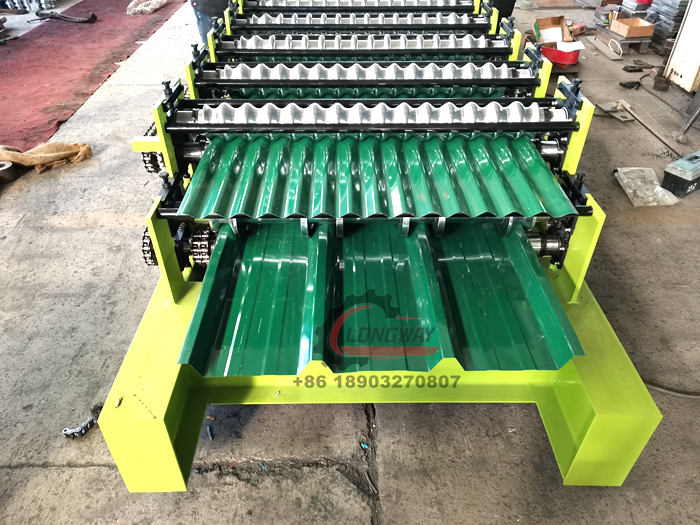Average Cost Insights for Steel Roll Forming Machinery
Understanding the Average Price of a Steel Roll Forming Machine
In the world of manufacturing, steel roll forming machines play a pivotal role in producing a wide range of metal products. These machines are designed to convert flat sheets of metal into specific shapes, which are then used in various industries, from construction to automotive manufacturing. As demand for high-quality metal products continues to rise, understanding the average price of steel roll forming machines becomes essential for businesses looking to invest in this technology.
What Is a Steel Roll Forming Machine?
A steel roll forming machine is an industrial equipment used to shape and form steel or other metals into desired profiles. The process involves passing the metal sheets through a series of rollers that gradually bend them into specified cross-sectional forms. This method is efficient for producing long lengths of material, making it ideal for items like roofing, siding, panels, and various structural components.
Factors Influencing the Price
The price of a steel roll forming machine can vary significantly, influenced by several factors
1. Machine Type and Size Different types of roll forming machines are designed for specific applications. For instance, a basic entry-level model will generally be less expensive than specialized machines that offer advanced features or can process thicker materials. Larger machines, designed for high-volume production, also tend to be pricier.
2. Material and Construction Quality The quality of materials used in the machine's construction impacts the price. Machines made from high-grade steel and equipped with robust components tend to have higher initial costs but may offer better longevity and performance.
3. Customization and Features Customization options, such as adjustable roller positions, integrated automation systems, and advanced control panels, can increase the machine's cost. Buyers need to consider what specific features will best meet their production needs.
4. Brand and Manufacturer Reputation Established manufacturers with a track record of producing reliable machines often command higher prices. Their products may come with better warranties and customer support, which can justify the investment.
average price of a steel roll forming machine

5. Location and Shipping Costs The geographical location can affect pricing as well. Machines manufactured in one country may incur higher shipping costs when sold in another. Local market demand and supplier availability can also play a role.
Average Price Range
On average, steel roll forming machines can cost anywhere from $10,000 to over $200,000. Entry-level models typically start around $10,000 to $30,000. These machines are suitable for smaller operations that may require less complex shapes and materials. Mid-range models can range from $30,000 to $100,000, offering better durability and more advanced features suitable for mid-sized businesses.
However, for large-scale industrial applications requiring high-speed operations and precision, the prices can soar, reaching upwards of $200,000. High-end machines often include automation features, enhanced safety measures, and the capability to produce customized profiles, making them a worthwhile investment for companies looking to increase efficiency and production capacity.
Return on Investment
While the upfront cost of a steel roll forming machine can be significant, businesses must consider the potential return on investment (ROI). A well-chosen machine can lead to increased production efficiency, reduced waste, and lower labor costs. Furthermore, with the ability to manufacture specialized products in-house, companies can improve their market competitiveness and profitability.
Choosing the right machine is crucial. Companies should evaluate their specific needs, production volumes, and available budget. It may also be beneficial to consult with machine manufacturers or industry experts to make informed decisions that align with business goals.
Conclusion
In conclusion, the average price of a steel roll forming machine is influenced by various factors, including machine type, construction quality, and additional features. Understanding these elements and evaluating your specific business requirements are essential steps in making a strategic investment. While the cost may seem high, the potential returns in efficiency and production capabilities can make it a worthwhile endeavor for many businesses in the manufacturing sector. As the market continues to evolve, investing in the right technology will be critical to staying competitive and meeting customer demands.
-
Roof Panel Machines: Buying Guide, Types, and PricingNewsJul.04, 2025
-
Purlin Machines: Types, Features, and Pricing GuideNewsJul.04, 2025
-
Metal Embossing Machines: Types, Applications, and Buying GuideNewsJul.04, 2025
-
Gutter Machines: Features, Types, and Cost BreakdownNewsJul.04, 2025
-
Cut to Length Line: Overview, Equipment, and Buying GuideNewsJul.04, 2025
-
Auto Stacker: Features, Applications, and Cost BreakdownNewsJul.04, 2025
-
Top Drywall Profile Machine Models for SaleNewsJun.05, 2025








